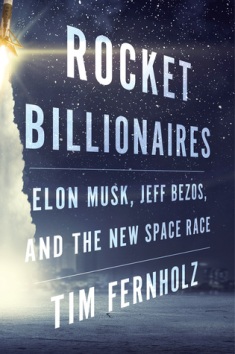 Ever since I started reading this book I want to grab every stranger on the street by the collar and yell at them: “We’re going to Mars!”
Ever since I started reading this book I want to grab every stranger on the street by the collar and yell at them: “We’re going to Mars!”
This book has been with me for the last two weeks and it has left me completely mesmerized by the unquenchable fires of human innovation and by how much can be achieved through mass collaboration. Rocket Billionaires, written by Tim Fernholz, follows the narrative of Elon Musk and Jeff Bezos and the plan to create a colony on Mars in hopes that humans can become a multi-planetary civilization.
Fernholz focuses on the competition between Bezos and Musk to realize their visions of humanity as a multi-planetary civilization by building space companies focused on reusable technology. Fernholz spends some time examining the managerial differences between Bezos and Musk and looks at how these differences affect their relationship to this project. Aside from the clash between the two billionaires, there was also a tension between military-industrial space programs and these new, self-made, space companies. Fernholz describes how NASA policymakers stepped in to save SpaceX when it was on the verge of bankruptcy. The plan as we know it, is that in the next decade there will be an attempt to place the first colony on Mars. Over time, this colony’s goal will be to grow to one million citizens so that it can get started. Supplies sent on each individual mission will include a new batch of people as well as foods, plants, technologies etc. in order to create greenhouse farms, Martian villages with hospitals and schools, and a full-on functioning civilization.
This book is exemplary journalistic work. Fernholz relates the story of these two self-made companies to the public in a non-biased way. It is evident on every page how passionate Fernholz is about this project and it really shows, yet he maintains an academic, non-intrusive journalistic voice. The narrative flows smoothly and is by no means elitist or exclusive.
Reading this book made me jot down a lot of questions. For instance, I wonder if the women who embark on this mission be under insurmountable pressure to procreate. Will future generations look back and remember Elon Musk and Jeff Bezos in a kind of Henry Ford/Thomas Edison way, or will people forget the financial struggles and remember the name of the first man/woman to step on Martian soil, the way we all know the name of Neil Armstrong? What technologies will be created as a result that could better life on Earth? After discussing this topic over the last two weeks with people at home, work, and public spaces, I was taken aback with how ‘civilians’ receive information about this project. For one, everyone ‘heard’ about this topic, and yet, they look at it both as ‘old news’ and as a ‘it’s probably not going to happen in our lifetime.’ For me, this book has been eye-opening. The project is not only on its way in a monumental way, but it will happen within the next decade. The second comment I am met with when bringing up this topic is “what a waste of money, why not save the starving, struggling people here on Earth first?” While I agree that it is a fair point, this project is equally important. I am somewhat relieved that the people leading this project are very much focused on renewables, and reusable technologies.
Henry Ford famously said: “If I had asked people what they wanted, they would have said faster horses.” That is to say, we don’t know what this undertaking will accomplish for humanity yet. This book makes me see the scientific intrigue to colonizing Mars. It will be monumental on an engineering, scientific, educational, and human level—no matter how the mission will go. It will make students want to study the sciences even more ardently than before, and as Fernholz narrowed it down in this book, one of the answers to the question of “why go to Mars?” really can be as simple as: “because it’s there.”
Fernholz relates often the reality of the project to the leading figures in science fiction literature particularly that of the big three: Isaac Asimov, Arthur C. Clarke, and Robert Heinlein, and of course Kim Stanley Robinson whose Red Mars trilogy is precisely this project (set in 2026 no less). The sprinkling of sci-fi references made this book exemplary. The sci-fi allusions act as a cohesive between the imagination found in the arts and what the great minds of scientists, programmers, engineers, and mathematicians can help bring to fruition—making readers see the beauty in humanity’s collective effort.
Would I recommend this book? YES!
Tim Fernholz is one of the leading journalists reporting on SpaceX and one of the best news commentary experts. Many of his articles have been featured in Quartz, and you may recognize him from the 2016 Quartz/Marketplace economics podcast: Actuality. Fernholz was both a Knight Journalism Fellow and at the New America Foundation in Washington D.C. He is a Georgetown University alumni with studies in Government, Theology, and Arabic, and one of the founding editors for the Tomorrow Magazine. If you’d like to learn more about his other fascinating projects, and previous journalistic work, you can find more information here.
The book is available as of Tuesday, March 20th, 2018 on Amazon, Audible, (read by Erin Moon) and The Book Depository, as well as your local bookstores (some links: Indigo, Barnes & Noble, Blackwell’s) and of course libraries.
Many thanks to Houghton Mifflin Harcourt both for publishing this wonderful book and for sending me a review copy. The book design is completed by Graphic Artist Chloe Foster.